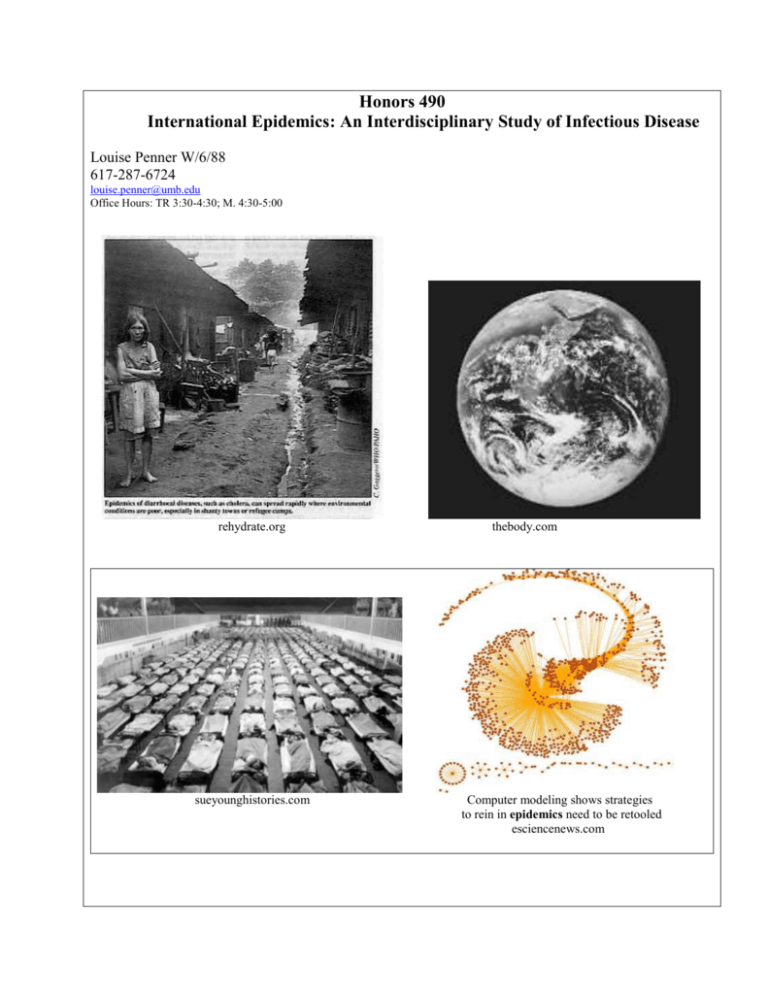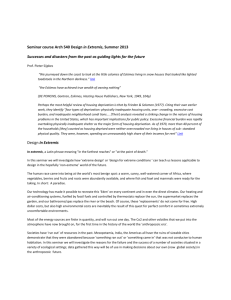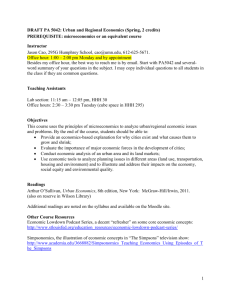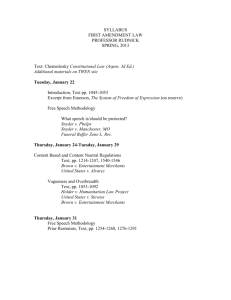WEEK ONE - Honors 490 - Professor Penner
advertisement

Honors 490 International Epidemics: An Interdisciplinary Study of Infectious Disease Louise Penner W/6/88 617-287-6724 louise.penner@umb.edu Office Hours: TR 3:30-4:30; M. 4:30-5:00 rehydrate.org sueyounghistories.com thebody.com Computer modeling shows strategies to rein in epidemics need to be retooled esciencenews.com Course Description: Welcome to the honors cross-cultural symposium! The honors program, particularly Rajini Srikanth and Dick Cluster, designed the senior honors colloquia to provide students with challenging, interdisciplinary courses with an international focus. The International Epidemics colloquium offers speakers from a range of academic and professional disciplines, all of whom, in some way, help in the effort to study, cope with, and/or prevent epidemics in this country and/or abroad. This course has two main goals: 1) To work together with each other, with faculty, and with practitioners to look at the topic of epidemics from a very wide variety of disciplinary and practical perspectives. 2) To prepare for a more specifically focused examination, next semester, of AIDS in South Africa in the context of that country’s history and development. 3) To offer a unique experiential learning opportunity in a two week trip to Cape Town, South Africa where we meet with social activists, medical professionals, academics, undergraduate students, and others involved in the struggle with HIV, AIDS, and TB in South Africa. More details about the trip will be forthcoming. The Colloquium Structure: Think of this course itself as a kind of research conference, at which a series of presenters are talking about their topics. Their various presentations may agree, overlap, diverge, complement each other, or diametrically disagree. We’re going from talk to talk (and reading to reading, because in this “conference” there are readings attached), drawing what we can from each and trying to put it all together for our own purposes. We’ve organized the different talks into a series of what would at an academic conference be called “panels” -- that is, the presentations within a panel fit within a certain thematic range, but each speaker is doing his or her own thing. This structure replicates the experience of functioning within the academic world where one is faced with competing views, conflicting information, areas where facts are frustratingly many or few. We hope that the class structure also replicates the experience of all of us living in the “real” world: attempting to make sense out of many competing facts and opinions about crucial issues affecting our lives, facts and opinions that no one has previously synthesized into a whole. The course will challenge all of us, myself included. Though I have been working in the area of what’s called “medical humanities” [roughly speaking, the study of the humanistic—as opposed to the natural science—aspects of medicine] for some time, I’m no more expert in the area of infectious disease than you are. I will contribute my knowledge of some of the disciplines and my experience as a teacher and researcher, in order to push you to develop your skills at thinking critically about and synthesizing the vast amounts of new material we’ll be encountering. But I’ll be trying to absorb, critique, and make use of that same new material, and many of you will be more expert in particular areas than I am. I’m excited to work with all of you in this intellectually provocative and vitally important interdisciplinary area of study. Friends of The Treatment Action Campaign Facebook.com Assignments and Grading Reading: Active, thoughtful reading of all assignments is a basic requirement. Please prepare yourselves for some degree of confusion about what is assigned, since presenters will be determining these readings as we go along. That’s why some readings are listed in the schedule and some not. Also, in line with student recommendations last time, some readings will be due before a given presentation, while others will be assigned as follow-up. Please check the course website and my handouts regularly, and be in contact with me with any doubts. I’ve ordered four required books through the bookstore: Plagues and People, The Demon in the Freezer, Angels in America, Part I, and The Anatomy of a Miracle. All other assignments will be available for downloading via course website, Healey e-reserves, or public websites. Attendance & participation, 10%: I’ll expect regular attendance and active participation from everyone. I expect everyone to miss no more than two classes. Exemplary participation can get extra credit. Exemplary doesn’t necessarily mean talking the most, but taking responsibility for listening and facilitating good group discussion as well. Research-in-progress notes (journal), 20%: For most presentations and associated readings I’ll ask for a journal entry of two-to-three doublespaced pages. I’d like you to: 1) Summarize briefly the main points of the reading-and-presentation. 2) Comment on your reactions: questions, doubts, agreements, disagreements, relationship between this and other readings and presentations. 3) List what -- for your purposes -- you see as the most important questions for further investigation. Keep a copy for yourself, to be part of your ongoing record of the symposium. Also hand in a copy to me. I’ll collect these periodically hand them back with comments. Format: Any format you want, as long as I can follow it. For instance, you could use three columns, one for summary of points and the others for comments and future research questions, or you could do each piece in diary format, etc. These notes do not need to be in formal essay format, that that approach is okay too. Grading: Satisfactory completion on time = A. If not satisfactory, I’ll let you know why, and you can rewrite. Detailed summary/comments for the whole group, 15% After each presentation, two students will be responsible for preparing an in-depth summary and comment (minimum five pages). This should be along the same lines as above, but more detailed and taking account not only of your own reactions but others expressed during class. You’ll post this on the course web site by the next class meeting. At the beginning of the next class, your pair will lead a brief discussion (up to ten minutes) of some issue(s) raised by that previous presentation/reading. Scheduling: We’ll make a sign-up sheet and parcel out responsibility to pairs of students. Each student will probably contribute to two such reports. (Each time you do one of these, you don’t need to hand in the individual short journal.) Grading: Again, satisfactory completion on time = A. One intermediate paper, 20% 5-8 pages each. Details forthcoming. These will draw on the readings and presentations and not require additional research other than adding things from your own knowledge and experience. Your assumed audience for this paper will be each other or future students in this course. These papers will get evaluative letter grades. Final paper and presentation, 35%: This assignment invites you to move outside of the genres of strictly academic writing that you’re used to. We’d like you to imagine writing in a different kind of genre and to a different kind of audience. For example, you might consider writing a grant proposal to a government agency, an informational address to a community center or an audience of high school or grade school students. Define an audience outside the symposium. In a page, explain who the members of this audience are and why you want to talk to them about infectious disease. Then, keeping in mind these people, their concerns, and your reason for addressing them, write a paper that synthesizes and/or expands some important part of what you’ve gotten from this symposium. Depending on your audience and your purpose, you may make use of varying numbers of panels and presentations and readings. The narrower your use of symposium materials is, the more additional research you should do. This paper will get an evaluative letter grade. During the last class, students will provide a short presentation of their final project highlighting its research method, claims, and results. Students will each get feedback from colloquium participants and me. actupny.org Required Texts: (Available in the UMB Bookstore) Many other materials will be available either on our Course WIKISITE. Should the site go down for any reason, copies will be available from Joyce to copy and return immediately to her. William McNeil, Plagues and Peoples. Anchor. 978-0385121224 Pbk. Tony Kushner, Angels in America, Part 1: Millennium Approaches: ISBN: 978-1559360616 Pbk. Richard Preston, The Demon in the Freezer: A True Story. Random House. ISBN: 978-0965619660 Pbk. Patty Waldmeir, Anatomy of Miracle: The End of Apartheid and the Birth of the New South Africa. Rutgers University Press; ISBN 1998 978-0813525822 Pbk. panama-guide.com Tentative Schedule of Speakers and Readings: WEEK ONE: September 5 (Monday) Labor Day Holiday September 6 (Tuesday) Classes Begin September 8 (Thursday) Professor Jacqueline Carlon, Classics Dept. Ancient Medicine Read Chapter 4 of The Healing Hand by Guido Majno (On e-reserve) and Thucydides 2.47.155 on the Athenian plague. A good translation of the latter is online at: http://www.livius.org/pb-pem/peloponnesian_war/war_t05.html. WEEK TWO September 13 (Tuesday) Professor Louise Penner, English Dept. and Catherine Reyes Harvard Medical Student and UMass Boston graduate Contagionism versus Anticontagionism in the Nineteenth Century “Plague, Typhus, Quarantine” and Selection from Florence Nightingale, Notes on Nursing Add/Drop Ends September 15 (Thursday) Professor Peter Taylor, Director, Program in Science, Technology, and Human Values Read Fred Pearce, “Inventing Africa,” New Scientist vol 167 issue 2251 - 12 August 2000 WEEK THREE September 20 (Tuesday): Panel 1 Discussion: Panel 1 Journals Due September 22 (Thursday): Professor David Hunt, History Dept. World History Perspective on Epidemic Disease Read Plagues and Peoples. In UMB bookstore Intro, Chapters 4-6, and handout WEEK FOUR September 27 (Tuesday): Professor Cheryl Nixon, English Dept. An 18thc epidemic Read Daniel Defoe’s A Journal of the Plague Year, September 29 (Thursday): Michelle Foster, Chemistry Dept. Read Richard Preston, The Demon in the Freezer And suggested reading: Elizabeth A. Fenn, “Biological Warfare in Eighteenth-Century North America: Beyond Jeffery Amherst,” The Journal of American History, Vol. 86, No. 4. (Mar., 2000), pp. 1552-1580. WEEK FIVE October 4 (Tuesday) Michelle Foster 2 October 6 (Thursday) John Ebersole, Biology Dept. Disease Evolution and its Implications. Read P. W. Ewald, Evolution of infectious disease, Chapters 3, 5, 6, 7 WEEK SIX October 10 (Monday) Columbus Day (Holiday) October 11 Panel Two Discussion; Panel Two Journals Due October 13 (Thursday) John Ebersole 2 Ewald Continued WEEK SEVEN October 17 (Monday) Mid-Semester October 18 (Tuesday) BUZZ CUE Property Rights and Patients’ Rights: Patents, Generics, Treaties, and Politics as They Affect Development and Accessibility of Medications in Third World October 20 (Thursday) John Ebersole 3 Ewald Continued WEEK EIGHT October 25 (Tuesday) Rajini Srikanth, English Dept. Patents, Generics, Treaties, and Politics as They Affect Development and Accessibility of Medications in Third World. Read AVERT primer on “Trade-Related aspects of Intellectual Property Rights,” Pharmaceutical Research and Manufacturers of America press releases, R. Srikanth, “Cipla and Yusuf Hamied”; Thomas W. Pogge, "Human Rights and Global Health: A Research Program. "Metaphilosophy Vol. 36 Nos. 1/2 (January 2005): 182-210; and optional further readings. PAPER #1 Due October 27 (Thursday) Panel Three Discussion: Panel 3 Journals Due WEEK NINE November 1 (Tuesday) Robert Lublin, Theater Dept. Read Angels in America: Part One: Millennium Approaches November 3 (Thursday) Louise Rice, RN, Independent Public Health Consultant, former Director of Public Health and School Health Nursing, Cambridge MA Public Health Dept Tuberculosis: Ancient Disease, Modern Challenges. Readings TBD WEEK TEN November 7 (Monday) Spring '12 Registration Begins November 8 (Tuesday): TBA November 10 (Thursday): TBA Course Withdraw Deadline Pass/Fail Deadline November 11 (Friday) Veterans Day (Holiday) WEEK ELEVEN November 15 (Tuesday) Biology of HIV with Evan Lyon (on VIDEOTAPE) Read Irwin, Millen, and Fallows, Global AIDS: Myths and Facts, Tools for Fighting the AIDS Pandemic: preface (Achmat), intro (Farmer), “HIV/AIDS Basics,” and “Myth one: AIDS and Africa.” Jim Yong Kim and Paul Farmer, “AIDS in 2006 — Moving toward One World, One Hope?,” New England Journal of Medicine, Volume 355: 645-647, August 17, 2006, Number 7. Optional: two technical papers on AIDS origins from Nature. November 17 (Thursday) Jennifer Kwan HIV/AIDS mother-to-child transmission Readings TBA WEEK TWELVE November 22 (Tuesday) Panel Four Discussion: Panel Four Journals Due November 24 to 27 (Thursday to Sunday) Thanksgiving Recess – NO CLASS WEEK THIRTEEN November 29 (Tuesday) Rajini Srikanth Read Waldmeir, Anatomy of a Miracle December 1 (Thursday) Professor Arachu Castro, Department of Global Health and Social Medicine; Program in Infectious Disease and Social Change, Harvard University Medical School Grassroots strategies for AIDS education and treatment; PIH work in Haiti and elsewhere. Lyon and Farmer, “Inequality, Infections, and Community-Based Healthcare,” Yale Journal of Health Policy, Law, and Ethics. Paul Farmer and Arachu Castro, “Pearls of the Antilles? Public Health in Haiti and Cuba,” from Unhealthy Health Policy. Ed. Arachu Castro and Merrill Singer. New York: Altamira Press, 2004, Pp 3-28. Sarah Z Hoffman, “HIV/AIDS in Cuba: a model for care or an ethical dilemma?,” African Health Sciences, Vol. 4, No. 3, December, 2004, pp. 208-209. Also optional additions readings on Cuba. WEEK FOURTEEN December 6 (Tuesday): Professor Kim Miller, Director of Women’s Studies, Professor of Art History, Wheaton College HIV/AIDS Activist Art in South Africa; Readings TBA December 8 (Thursday): Final Panel Discussion: FINAL JOURNALS DUE S. Africa Discussion WEEK FIFTEEN December 13 (Tuesday): Final Project presentations: S. Africa Discussion December 14 (Wednesday) Classes End Final Projects are due Thursday, December 15th by 5:00 pm to my mailbox in the English Dept. Office W/6/82. If, for any reason, you need to email me your final project, please get permission from me first and contact me if you do not receive confirmation that I’ve received your project within 24 hours. andreazeelie.com







